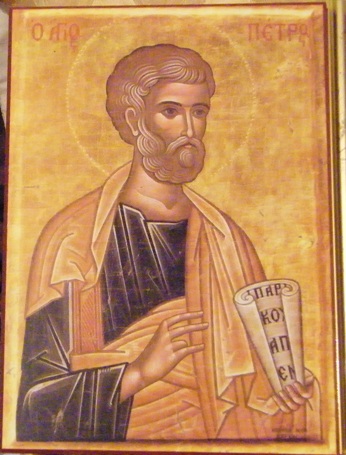THE FIRST CATHOLIC EPISTLE OF THE HOLY APOSTLE PETER Archbishop Averky of Syracuse

Place and Time of Writing. The place from which St. Peter wrote his first epistle is indicated as Babylon (5.13). The Roman Catholics, in affirming that the holy Apostle Peter was for 25 years bishop in Rome, wish to see in this ‘Babylon’ an allegorical name of Rome. Such an allegory would hardly be appropriate in the parting greeting. It is more natural to see in this the real name of a city. There is no need to suppose that this was Babylon on the Euphrates – we have no information that St. Peter visited it. In Egypt, there was a small town on the banks of the Nile which had been founded by émigrés from Babylon, who also called it Babylon. We know about a Babylonian Church in Egypt from the history of the Christian Church (Lives of the Saints, June 4, Life of St. Zosima). St. Peter was in Egypt and consecrated St. Mark as bishop in Alexandria there, and for that reason, it is completely natural that he should write from there and convey a greeting from St. Mark.
It is impossible to say precisely when this epistle was written. Presuppositions about the time of its writing are based on the fact that St. Peter was accompanied at that time by Siluan and Mark, in whose name the Apostle sends greetings to Asia Minor (I Peter 5.12,13). Both these people traveled with the holy Apostle Paul and were well known to the Asia Minor Christians. They could have left him, probably, only after St. Paul had been arrested and sent to Rome to be judged by Caesar (Acts chps. 26-27). It was also natural for Peter to take care of Paul’s flock after his arrest. And since the first epistle was written not long before the second, which was undoubtedly written before the martyric death of St. Peter, which took place in 67, the date of the writing of the first epistle is fixed at between 62 and 64 A.D.
Exegesis. The holy Apostle Peter begins his first catholic epistle with the words: ‘Peter, an Apostle of Jesus Christ’, and it is impossible not to see in this the holy Apostle’s deliberate aim to put forward his apostolic dignity, for the churches to which he was writing had not been founded by him and did not know him personally. Having then listed those to whom his epistle was addressed, St. Peter for the whole of the rest of the epistle tries by various God-inspired instructions to strengthen and exalt the moral life of the persecuted Christians of Asia Minor. In the first two chapters, he reveals ‘the greatness and glory of the salvation given to us in Jesus Christ’, which gives this section a dogmatic flavour. The other chapters are dominated by exclusively moral instructions.
The Christians of Pontus, Galatia, Cappadocia, Asia, and Bithynia were called by the holy Apostle ‘strangers’ in a dual sense: they were living outside their fatherland, Palestine; and for Christians life on earth is the wandering of strangers, for the fatherland of the Christian is another world, a spiritual world. The Apostle calls them ‘elect’ in the sense that in the New Testament all Christians constitute a new elect people of God, as were the Jews in the Old Testament (1.1). They were elect ‘according to the foreknowledge of God the Father, through sanctification from the Spirit, to the obedience and sprinkling with the blood of Jesus Christ’ – all three persons of the All-Holy Trinity took part in the work of the salvation of men: God the Father, according to His foreknowledge, knowing who will use the free will given to him in what way, predestines men for salvation; the Son of God by His death on the cross accomplished the very work of salvation; while the Holy Spirit through His grace sanctifies the elect, appropriating to them the work of salvation accomplished by Christ (v. 2). From the depth of a heart filled with gratitude to God for the redemption of the world, the Apostle goes on to glorify God, Who has given men ‘an incorrupt heritage’ as opposed to the sensual, earthly one which the Jews expected from the Messiah (vv. 3-4). Having then said that the power of God preserves them ‘through faith to salvation’, the Apostle intimates that this salvation will be revealed in all its power only in ‘the last time’; but now it is necessary to be sorrowful ‘a little’, in order that faith that is tried by the fire of temptations should turn out to be more valuable than the most purified gold ‘at the appearance of Jesus Christ’, that is, at His Second Coming (vv. 5-7). On the basis of all that has been said above, the Apostle suggests a series of moral instructions, strengthening them with lofty dogmatic contemplations. The first general instruction is on perfect hoping on the grace of Christ with childlike obedience to God as Father and the striving to be likened to Him in holiness of life: ‘be ye holy, even as I am holy’ (vv. 13-16). They must be stirred up to this by the lofty consciousness of the greatness of the price for which Christians have been redeemed: ‘not with silver or gold’, ‘but with the precious blood of Christ’ (vv. 17-20). This contains a lofty enticement to preserve the faith of Christ and firmly hold to it in spite of all temptations (vv. 21-25).
In the second chapter St. Peter intimates to Christians that, living amidst pagans who are hostile to them, they must show by their holy, virtuous life that they are ‘a chosen race, a royal priesthood, a holy people, men who have been set aside so as to proclaim the perfection of Him Who has called them from darkness into His wonderful light’. Then the pagans, seeing the virtuous life of Christians, will themselves be converted to Christ and glorify Him for that for which they previously abused the believers.
Here, in refutation of the false teaching of the Roman Catholics that the stone on which the Church is founded is the personality of the Apostle Peter, it is important to note that the holy Apostle Peter himself gives the name of ‘stone’ not to himself, but to the Lord Jesus Christ, as is evident from verse 4. The foundation of the Church, its cornerstone, is Christ Himself, and all the believers, the member of the Church are ‘living stones’ – they must construct out of themselves on this Stone ‘a spiritual house, a holy priesthood, so as to bring spiritual sacrifices pleasing to God’ (v. 5). Just as God in the Old Testament had His temple and priests, who served Him by offering sacrifices, so in the New Testament, the whole society of Christians in the spiritual sense must be at the same time both temple and priests. This is of course metaphorical language, and it does not do away with the priesthood as a special class of people placed in the Church to teach, accomplish the sacraments and administer. All believers are called ‘a holy priesthood’, because they must ‘offer spiritual sacrifices’ to God, that is, sacrifices of virtue. The virtues are called ‘sacrifices’ because practicing them is linked with the exploit of suppressing their passions and lusts. In vv. 6-8 the holy Apostle again calls the Lord Jesus Christ ‘the cornerstone’, citing the prophecy of Isaiah 28.16, the words of which undoubtedly refer to the Messiah. This prophecy was also referred by the Lord Jesus Christ to Himself (Matt. 21.42). In verse 9 the holy Apostle calls Christians again ‘an elect race, a royal priesthood, a holy people, men who have been set aside’ – all these characteristics are taken from the Old Testament names of the Jewish people and are applied to the Christians, since in the Christians there finally came to be fulfilled that which these names signified typically by application to the Jewish people (cf. Exodus 19.5-6). And St. John the Theologian in his Apocalypse says that in a spiritual sense the Lord Jesus Christ made all of us Christians kings and priests to God and the Father (1.6). These metaphorical expressions, which indicate only the lofty dignity of the Christian calling, must not of course be understood literally, as is done by the sectarians, who on the basis of these words of the Apostle reject the priesthood and royal power that has been legally established in the Church. ‘Once not a people, but now the people of God’ (v. 10) – these words are borrowed from the Prophet Hosea (2.23), where God while calling the then people of the Jews, not His own people, since they were unworthy of it because of the sinful manner of their life, promises that in the time of the Messiah the people will be made worthy that God should say to them: ‘you are My people’. This prophecy was fulfilled when the best part of the Jewish people accepted the teaching of Christ. Still more can it be referred to the Christians from the former pagans. From verse 11 the Apostle begins to give purely moral instructions touching the inner and personal life of the Christians. Here he, as it were, reveals in detail in which this royal priesthood of the Christians consists, what spiritual sacrifices they must offer and how they must behave in order that the pagans, seeing their virtuous life, should glorify them for that for which they now abuse them. At the head of the persecutors of the Christians were the pagan authorities and the upper classes of pagan society, while Christianity originally spread primarily among the slaves. The rightless condition of these slaves was made still worse with their reception of the persecuted faith of Christ. Consciousness of the injustice of the persecutions could elicit murmuring and opposition among the Christians who were not yet strengthened in the faith. Warning against this, the Apostle in verses 13-19 teaches submission to every human authority ‘for the Lord’s sake’. This obedience and Christian freedom by no means exclude each other. On the contrary: freedom understood in the true sense imposes the obligation of obedience and the obligations linked with it. Christian freedom is spiritual freedom, not external: it consists in freedom from slavery to sin, the sinful world, and the devil, but at the same time it is slavery to God and for that reason imposes obligations demanded by the Word Himself. Christian freedom can be abused by reinterpreting the concept of freedom and covering by means of it all kinds of licentiousness, which Christians must fear. Warning against such an abuse of the concept of Christian freedom, the Apostle perhaps has in mind the Gnostic false teachers that had then appeared. Calling for the patient bearing of unjust sufferings, the Apostle points to the example of the Lord Jesus Christ Himself (vv. 20-25), and persuades the Christians ‘to follow in His steps, that is, to imitate His patient bearing of sufferings.
In the third chapter, the holy Apostle gives moral instructions to wives, husbands, and all Christians. To the wives, the Apostle commands that they should obey their husbands. Here he had in mind particularly Christian wives who were married to husbands that were Jews or pagans, who had not accepted the faith of Christ. The situation of these wives was, of course, very difficult. It was natural for the temptation to arise in them of being under the special direction of people already enlightened with the Christian faith, that is, men who were not their husbands, and of being in special relations of obedience to these men who were not their husbands, which could engender misunderstandings and troubles in family life. The Apostle takes special care to warn such wives against such a temptation and intimates to them that they should obey their own husbands, even if they were unbelievers. And he indicates the lofty purpose of this: ‘so that those of them who do not obey the word may be won by the life of their wives without the word’. The Apostle intimates that the true adornment of the Christian woman consists not in external adornments but in the inner beauty ‘of a meek and silent spirit, which is precious before God’ (v. 4). As an example, the Apostle cites Sarah, who obeyed her husband Abraham. The heavy condition of the woman, both in the ancient pagan world and among the Jews, incites the Apostle to give instructions also to the husband concerning the wife so that his command about the obedience of the wife should give the husband a reason for abusing this obedience. The husband must deal carefully with his wife, as with ‘the weaker vessel’ (vv. 5-7). The Apostle goes on to give moral instructions to all Christians in general, intimating to them that they should rejoice if they suffer for righteousness, for ‘Christ also… suffered for our sins, the righteous one for the unrighteous, being put to death in the flesh, but being quickened in the spirit: in which indeed He went to the spirits who were in prison and preached to them (vv. 8-9). By ‘prison’ here, as the Greek word used here shows, is meant ‘hades’ or ‘sheol’, the place where, according to Jewish belief, all the souls of men who died before the coming of the Messiah went; this place was in the nether regions, that is, beneath the earth or inside the earth. This is not hades in the sense of the place of the eternal torment of sinners, but nevertheless, it is still, as its name indicates, a constricting place for the human spirit, unpleasant and undesired. That is what the place was until the coming of Christ for all those who died in the Old Testament, although, even there, apparently, there were various degrees, depending on the impiety or righteousness of those who had died. Into this ‘prison’ the Lord descended to preach about the salvation of mankind that He had accomplished. This was a calling of all those who had died before Christ and were in sheol to enter into the Kingdom of Christ, and there is no doubt that those who repented and believed were liberated from the place of their imprisonment and led into the paradise that was opened by the resurrection of Christ – the place of the blessedness of the righteous. According to Church tradition, this preaching of Christ Himself in hades was preceded by St. John the Forerunner’s preaching about Christ there (see his troparion). ‘Those who once disobeyed’ means that the preaching of Christ the Saviour was also addressed to the more stubborn sinners, as an example of whom the Apostle cites the contemporaries of Noah, who perished in the flood. From chapter 4 verse 6 we can conclude that among those there were some who were saved by the preaching of Christ in hades: ‘for for this cause was the Gospel preached also to them that were dead, that they might be judged according to men in the flesh (that is, perished and suffered in the body), but live (in the world beyond the grave) according to God in the spirit’. In this way the Apostle also emphasizes that the preaching of Christ was addressed to all men without exception, not excluding also the pagans and, moreover, the most sinful among them (vv. 19-20). From the thought of the flood and those saved in the ark in verse 20 the Apostle passes to the sacrament of baptism, which was prefigured by the water of the flood. In verse 21 the Apostle defines the essence of baptism. It is not ‘a carnal washing of uncleanness’, similar, for example, to the numerous and various Jewish washings, which, while cleansing only the body, did not at all touch the uncleannesses of the soul: it is ‘the promise to God of a good conscience’. Of course, these words do not mean that a pure conscience or cleansing from the vices of the soul is not given in baptism, for he goes on to say that ‘baptism saves through the resurrection of Christ’ (v. 21). The Apostle indicates here only the necessity for the person being baptized of deciding to live a new life according to conscience.
The fourth chapter is completely devoted to moral instructions. These moral instructions are based on the thought of the sufferings of Christ: ‘insofar as Christ suffered for us in the flesh, you arm yourselves with the same thought: for he who suffers in the flesh ceases to sin’ (v. 1). The whole of this chapter is penetrated with the thought of the patient bearing of persecutions for the faith and the necessity of conquering the spiteful attitude of the enemies of the faith by a virtuous life. ‘He who suffers in the flesh ceases to sin’ – bodily sufferings, whether they are from a voluntary exploit of self-mortification or from oppression imposed from without, weaken the power and action of human sinfulness. At the same time the same thought is here expressed as in the sixth chapter of the epistle of the holy Apostle Paul to the Romans: that he who is crucified with Christ and dies with Him dies for sin, must consider himself dead for sin, but alive for God. The Apostle tries to convince the Christians not to be disturbed by the fact that the pagans abuse them for the radical change that has taken place in their lives, reminding them that they also will be judged by God for their debauchery (vv. 2-6). “The end is near for all’ – in the sense that the Christians must be ready for the Coming of Christ. From this, the Apostle derives the necessity of the moral life for Christians and gives a series of instructions, always placing love at their head, because ‘love covers a multitude of sins’ (v. 8), as the holy Apostle James also teaches. The fourth chapter ends with an instruction to the martyrs: ‘do not be surprised… at the fiery temptation’ (v. 12). Christians must fearlessly confess their faith, not fearing abuse and sufferings, but glorifying God that this is their lot (vv. 13-19).
The fifth chapter contains instructions to pastors and their flock, an Apostolic blessing, and concluding greetings. The Apostle exhorts the pastors to feed the flock of God, overseeing them not unwillingly, under compulsion, and not for disgusting gain, but from zeal and not lording it over the heritage of God, but giving an example to the flock. He tells the flocks to obey their pastors and give themselves humbly to the leadership of the strong hand of God. However, they themselves should be sober and vigilant, for their adversary the devil walks around like a lion, seeking whom he may devour. The three basic traits of true pastorship are here indicated by St. Peter as follows: 1) ‘Feed the flock of God which is among you, taking the oversight thereof not by constraint, but willingly and according to God’ – the pastor must himself be full of love for his great work, he must feel an inner calling to it, so as not to be a hireling instead of a true pastor (5.2); 2) ‘Not for filthy lucre, but eagerly’ – this is the second trait of good pastorship, which can be called unacquisitiveness. This does not mean that the pastor must not take anything from his flock (cf. I Cor. 9.7,13,14), but only that the pastor should not dare to place his personal profit and material advantage at the head of the corner of his pastoral activity; 3) ‘Neither as being lords over God’s heritage, but as examples to the flock’ – the pastor cannot help having authority over his flock, but this authority must not bear the character of worldly dominion with violence, restriction and oppression, in which elements of self-love would be evident; the true pastor must himself display a good example to his flock – then he will easily, without compulsion, acquire the necessary authority and spiritual power over them (5.3). For such good pastorship, the holy Apostle promises ‘an unfading wreath’ from the Chief Pastor, Christ (5.4). ‘Likewise, ye younger ones’, that is, all those who are not elders, not priests, but the younger ones in their position in the Church society, that is, the flock, ‘obey the elder ones’, that is, obey the pastors, ‘yea, all of you be subject one to another, and be clothed with humility: for God resisteth the proud, and giveth grace to the humble’. ‘Be subject one to another’ means that each person in his station must obey the elders, the people placed in authority over them, and thereby manifest humility, which alone attracts to a person the grace of God (5.5-7). The Apostle calls people to sobriety and spiritual vigilance, indicating that the enemy of man’s salvation, the devil, ‘goes about roaring as a lion, seeking whom he may devour’. Like a hungry lion, the devil, who is eternally spiritually hungry and eternally irritated with those whom he cannot devour, frightens them by his spitefulness like a lion by his roaring, and strives to cause them every kind of harm. It is necessary to resist him first of all ‘by firm faith’, for faith unites with Christ, the Conqueror of the devil (5.8-9). St. Peter ends his first epistle with God’s good wish that they firm and unshaken in the faith, conveys greetings from the Church in Babylon and for ‘my son Mark’, and gives them ‘peace in Christ Jesus’ (5.10-14).







